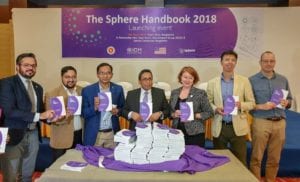Handbook launch events across the globe discuss diverse operations and how standards can help improve humanitarian action in complex situations

Sphere Executive Director Christine Knudsen at the Nairobi launch event. Photo credits: Plan International
Throughout March 2019, Sphere and its partners continued the roll-out of the new Sphere Handbook, with events scheduled across four continents. These events demonstrated a renewed commitment to providing better humanitarian assistance, as well as innovative ideas on how to work with humanitarian standards in some of the most difficult contexts.
Australia
Two launch events were organised in Melbourne and Canberra by Centre for Humanitarian Leadership, Department of Foreign Affairs and Trade, Humanitarian Advisory Group, RedR Australia, and Save the Children. At the Melbourne event, Sphere shared the stage with ALNAP, framing the new Handbook edition into the global trends highlighted by their State of the Humanitarian System (SOHS) report: an increase in efficiency and appropriateness of aid, but also a stronger call for accountability and more involvement of the communities affected by crisis (a recording of the full event is available online).
Bangladesh
In Bangladesh, the Handbook was launched during a full-day event in Cox’s Bazar, attended by high-ranking members of the Bangladesh government and representatives of national and international aid organisations. While in Cox’s Bazar, Sphere Director Christine Knudsen visited the refugee settlements – home to more than 900,000 Rohingya refugees. The event also included a workshop focusing on the Handbook’s technical chapters, which was an opportunity for the participants to reflect on what can be done to improve the quality of the assistance provided. This effort – explained Giorgi Gigauri, IOM Bangladesh Chief of Mission – is made particularly challenging by the fact that Rohingya communities mostly live in spontaneous settings rather than formal camps. “The launch conversations will allow the localisation of the Sphere indicators while still observing the essential humanitarian principles and standards”, commented Manuel Pereira, IOM Bangladesh Deputy Chief of Mission.

The panellists of the Cox’s bazar launch. Photo credits: IOM Bangladesh
The official Cox’s Bazar launch was followed by an event in Dhaka, organised by local focal point Sphere Community Bangladesh with support from COAST Trust and BRAC. The event gathered representatives of national and international NGOs, who learned about the new edition and suggested means to disseminate the standards more widely. What emerged from the reflection is a plethora of ideas and realistic commitments. “We found that besides community engagement, youth engagement brings fruitful results”, commented Badrun Nahar, from local NGO Dhaka Ahsania Mission. “We should advocate to include the Sphere standards in university programs”, proposed Dulon Gomes from World Vision. “We could ensure the dissemination of the standards by building local capacity”, added Caritas Bangladesh Executive Director Francis Atul Sarker.
Kenya
Building on the significant contribution the Handbook from East Africa humanitarian actors, the Handbook was also launched in in Nairobi, Kenya with the Inter-agency Working Group and hosted by Sphere member World Vision. The launch capped the week which focused on a 4-day training event with 34 participants from Kenya, Somalia, Uganda, Nigeria, and South Sudan. The purpose of the workshop was to pilot the new Sphere training package and receive feedback to be integrated into the final version for release.

Sphere director Christine Knudsen introduces the Handbook at the World Vision offices in Nairobi. Photo: Plan International
“We looked at how we can interact more with the Sphere standards”, said Mercy Shahale, from IFRC. “All participants were able to reflect on how to realistically apply the standards, especially when working with local partners and engaging with communities.”
“The Sphere Handbook has become a one-stop shop where you can find cross-cutting themes like PSEA (Protection from Sexual Exploitation and Abuse), Gender-Based Violence, and Monitoring and Evaluation”, continued Kulmiye Hussein, director of the local Somalia Lifeline Organisation. “From the training, I’ve realised that these themes are present in the content of every chapter”.
More events are set to take place in the next days and months. As a living community of committed practitioners, Sphere will continue to encourage debate and exchange on these critical themes, empowering the humanitarian community to provide even better and more accountable assistance to people affected by crisis.
